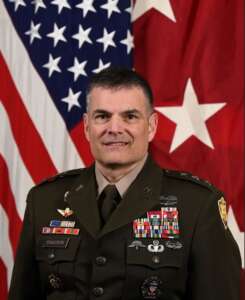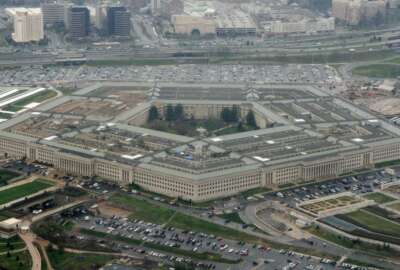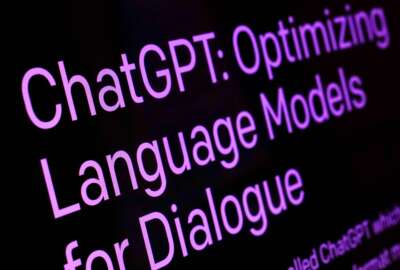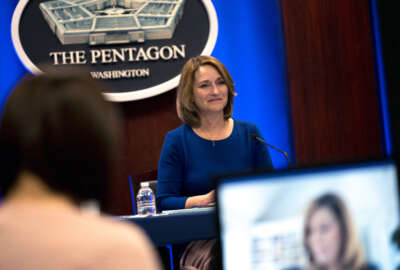DoD’s Joint Staff GenAI sprint lays out 8 internal use cases
Lt. Gen. Todd Isaacson, the CIO for the Joint Chiefs of Staff/J-6, said a review team is completing recommendations for leadership around using GenAI.
BALTIMORE — The Defense Department’s Joint Chiefs of Staff is getting on the artificial intelligence bandwagon.
The J6 recently completed a review of potential generative AI use cases to improve internal processes and now are deciding the next steps toward implementation.
Lt. Gen. Todd Isaacson, the director for command, control, communications, computers and cyber and the chief information officer for the Joint Chiefs of Staff/J-6, said at the AFCEA TechNet Cyber conference that the 90-day sprint looked at commercial generative AI tools and large language models that are already available to improve internal processes, such as a task or contract award.

“The second purpose was to then determine how we could potentially organize the Joint Staff and determine whether or not we wanted to stand up a Joint Staff chief data and AI officer (CDAO), which we have not yet determined, but is informed by the work that was done,” Isaacson said in an interview with Federal News Network. “Then, how do we endure the kinds of use cases that we had already put tools and capabilities in place? The final piece is how do we train teammates that when they come on board to utilize generative AI tools that are available, and institutionalize those? That’s the big idea behind the sprint. Now we’re in the reflection phase and getting ready to report back to leadership to determine what were the next set of a series of steps.”
Isaacson said the review team started with four use cases, but ended up completing eight as interest and excitement over the effort grew. He said the team has another 10 waiting for review. He added when the call went out for volunteers for the task force, the response was overwhelming, showing how much interest there is to use the GenAI tools.
The use cases were focused on how the GenAI tools could improve how action officers conduct analysis of large volumes of information, particularly historical financial, personnel and logistics data.
“There’s a lot of information to cull through so can you leverage LLMs to cull down the important components to maintain situational awareness on big items like that?” he said. “Those were largely internal. We didn’t use it for an intelligence function. We did it largely for internal joint staff keeping the conveyor belt moving kind of processes.”
Is a Joint Staff CDAO in the works?
Several military agencies and services are starting to take a deeper look at GenAI. The Air Force, for example, in May opened up a GenAI platform to airmen and civilians to use. Called the Non-classified Internet Protocol Generative Pre-training Transformer (NIPRGPT), the service hopes it can help with tasks such as coding, correspondence and content summarization, all on the service’s unclassified networks.
At the same time, Army CIO Leo Garciga is developing a new policy around GenAI and LLMs with a focus on data protection and the creation of guardrails for the interaction between the government and industry.
Over the next 60 days, the J6 review team will create recommendations for the J-6 leaderships to decide next steps.
Isaacson said the recommendations also will include whether creating a CDAO would be beneficial for the organization. DoD stood up its CDAO in February 2022.
“We’re going to have a conversation about if we want to organize ourselves in a different way to include an organic CDAO and whether or not we would find that valuable,” he said. “Into the fall, we would then be able to gain momentum based upon the decisions that are made. Currently, we have a CIO, which I perform. We have a CDO, which belongs to the Joint Staff/J6. That’s our current organization, but we saw the opportunity of the GenAI Task Force to take ourselves to task to determine through learning and doing if we wanted to establish a Joint Staff CDAO or not. It might be, we can’t make the investment because we’re not getting any larger. It might be, ‘hey, we definitely want to invest in it and this is how we’re going to do it.’ But nothing has been predetermined in that regard.”
The GenAI effort is part of a broader digital transformation effort across the J6.
Isaacson said his office issued a digital transformation campaign plan that outlines four levels of effort.
- People
- Infrastructure
- Tools and capabilities
- Rapid adoption
“The people piece is how do we develop, maintain and attract a digitally-enabled workforce. This is something that we are supremely focused on, and we appreciate the insights that industry could help us to make our pursuits more attractive in terms of best practice,” he said. “The second is the infrastructure. We partner very, very closely with the Defense Information Systems Agency, Joint Force Headquarters, DoD Information Network (JTHQ-DoDIN) partners to set the theater, set the conditions and set the enterprise. We rely very heavily as a joint force on that enterprise, and the investments for this data-centric pivot is laying a burden on the enterprise and the infrastructure.”
The GenAI review sprint falls into the third level of effort around adopting tools and capabilities. Isaacson said the use of data analytics and other emerging tools and capabilities need to lead to the J6 receiving better and more timely insights as part of its goal to achieve global information dominance.
Finally around rapid adoption, Isaacson said the DoD doesn’t necessarily move fast enough to take advantage of new or emerging technologies.
“We’re doing it better than we used to, and we are continuing to endeavor to make it better as we partner with our industry partners,” he said. “When you think about, say 10 or 15 years ago, when we would deliver a capability, oftentimes there was a tremendous learning curve that went along with it. These days the extraordinary innovation in digital awareness that our service members have, we’re able to deliver capability to them very quickly. But also, they become incredibly familiar with it right away and provide the feedback that I think is an important part. So having digital natives in our services give us a competitive advantage.”
Copyright © 2025 Federal News Network. All rights reserved. This website is not intended for users located within the European Economic Area.
Jason Miller is executive editor of Federal News Network and directs news coverage on the people, policy and programs of the federal government.
Follow @jmillerWFED








